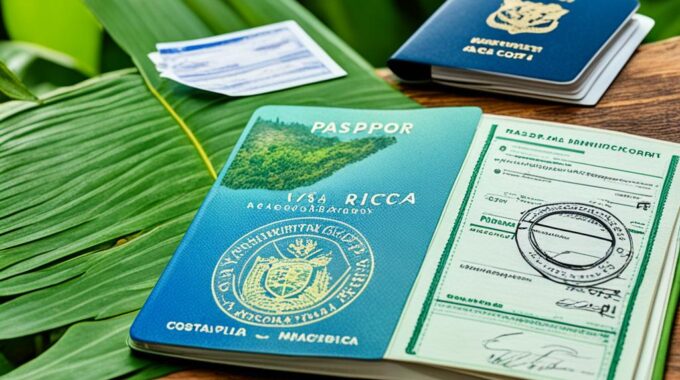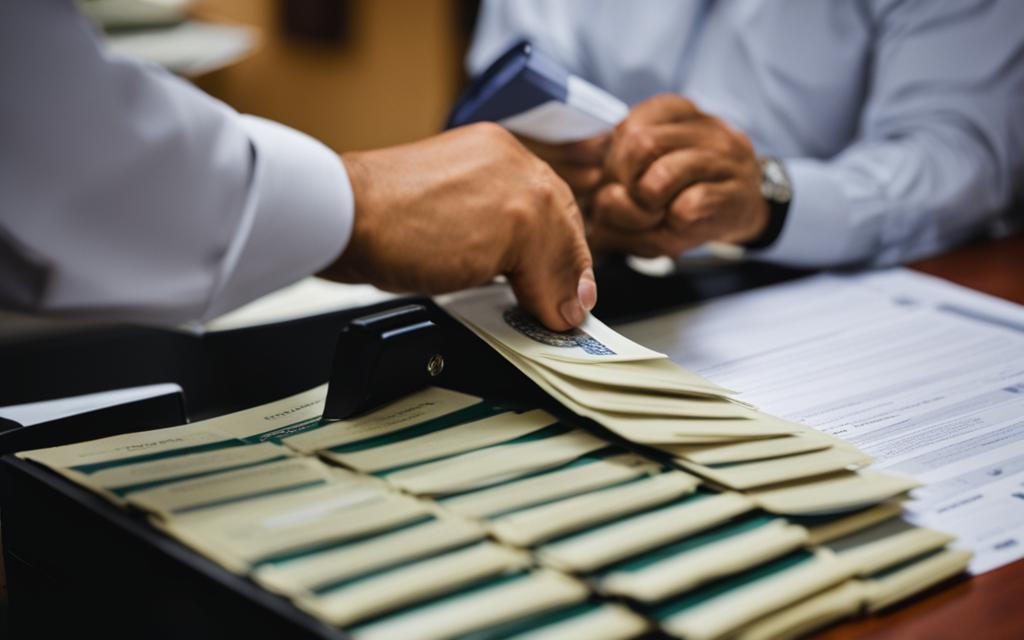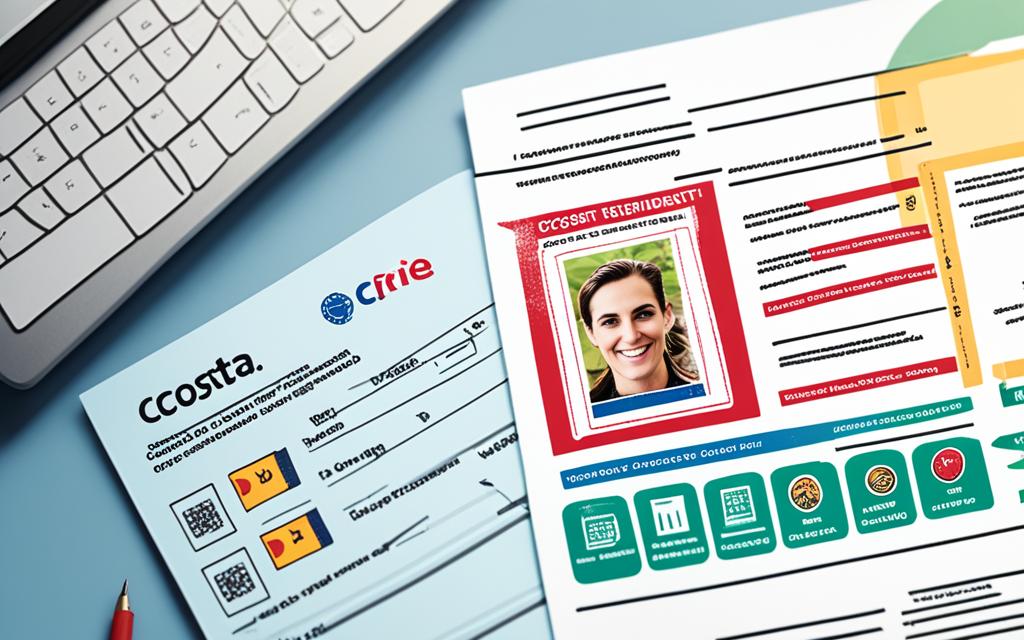As a hub for international workers and service providers, Costa Rica has introduced Law No…

Authenticating Docs for Costa Rica Residency With CRIE.cr
The quest for a life enriched by the ‘pura vida’ spirit beckons many to the verdant landscapes of Costa Rica. With a promise of tranquility intertwined with the vibrance of nature, the journey begins with the essential Costa Rica residency document authentication. This meticulous process is a cornerstone in the Costa Rica residency application process where precision and due diligence converge to meet the harmonious yet stringent costa rica residency requirements.
Costa Rica Immigration Experts (CRIE) provides bespoke document authentication services for costa rica residency, guiding hopeful residents through the labyrinth of legalizing documents for costa rica residency. These procedures comprise an integral part of the legal procedures for residency in costa rica, ensuring that each individual’s documents meet the high standards of oversight by Costa Rican authorities.
Residency document authentication in Costa Rica is not merely a formality but a crucial gateway to finalizing your residency status. With CRIE’s wealth of experience and dedicated service, applicants find a supportive ally in navigating the complex path of costa rica residency document legalization.
Embarking on this path with a partner like CRIE ensures that all intricacies, including authentication and legalization, are handled with professionalism and care—an assurance that instills confidence as one makes the transition to life in Costa Rica.
Key Takeaways
- Essential document authentication serves as the initial step towards fulfilling Costa Rica’s residency criteria.
- The immigration office in Costa Rica mandates authenticated documents for a successful residency application.
- Completeness and accuracy of documentation are paramount, including apostille or legalization and Spanish translation.
- Utilizing services like CRIE is essential for expert navigation through Costa Rica’s residency process.
- The document authentication phase is critical in ensuring compliance with Costa Rica’s immigration norms.
- Applicants should expect a thorough verification to meet the residency documentation requirements.
The Role of Document Authentication in the Costa Rica Residency Process
Establishing legal residency in Costa Rica is a multifaceted process that hinges on the successful authentication of crucial legal documents. It’s about adhering to the finely detailed costa rica immigration requirements that demand each piece of paperwork—from birth certificates to financial records—be verified and accepted under national law. Partnering with Costa Rica Immigration Experts (CRIE) can pivot an otherwise daunting procedure into a streamlined journey towards the pura vida lifestyle.
Key Documents and Submission Requirements
At the heart of the residency application lies the critical need for costa rica residency document verification which ensures that all submitted documents like birth certificates, financial proof, and criminal records are current and properly authenticated. Meeting these submission requirements is non-negotiable, as it forms the legal backbone of any residency claim in Costa Rica. Additionally, the documents must be appropriately translated into Spanish and notarized to be considered valid within Costa Rican legal frameworks.
Apostille and Legalization Explained
The mechanism of ensuring document legality comes in two forms—apostille and legalization. The apostille service simplifies the process for countries that are signatories to the Hague Apostille Convention, like the United States, involving a certification that confirms the authenticity of the document. Meanwhile, for countries not part of this convention, document legalization for costa rica residency is a meticulous procedure that involves multiple levels of government approval, guiding documents to international legitimacy.
Whether it’s obtaining a costa rica residency document apostille or moving through the steps of document legalization, understanding these processes is key to ensuring one’s paperwork is beyond reproach.
Choosing CRIE.cr for Expert Authentication Assistance
As experts in authenticating documents for costa rican residency, CRIE bridges the gap between complex legal mandates and the applicant’s need for a smooth verification journey. For those seeking assistance with costa rican residency document authentication, CRIE offers a comprehensive service package tailored to the distinct needs of retirees, investors, students, and others seeking to establish a new chapter of life in Costa Rica.
With expertise in both certificate of residency document authentication and apostille services, CRIE stands as a beacon for those venturing through the critical task of costa rica residency paperwork authentication and document validation for costa rica residency.

By mandating a verified body of documentation, Costa Rica ensures its array of immigrants—romanced by the country’s rich ecological beauty and harmonious lifestyle—are fully vetted and primed to contribute to the nation’s vibrant community. In this pursuit, the role of CRIE as a reliable custodian of costa rica document legalization becomes indispensable.
Authenticating Documents for Costa Rica Residency
At the core of the Costa Rica residency application lies a meticulous procedure of verifying personal and legal documents. The path to a successful Costa Rica residency visa navigates through the thoroughfares of stringent costa rica residency authentication protocols. Each applicant must understand the gravity of this process, as it underscores the veracity of their intent to join the vibrant community of Costa Rica. With the assistance of Costa Rica Immigration Experts (CRIE), the complex web of document authentication costa rica can be navigated with greater ease and accuracy.
Ensuring your residency document authentication is robust equates to laying a solid foundation for your new life under the Costa Rican sun. The attention to detail begins at the moment you question how to authenticate documents for costa rica residency.
The role of costa rica document authentication goes beyond mere formality; it is the linchpin for a residency process backed by legality and trust. As such, a reliable costa rica document authentication agency is not just an ally but also a guide through the intricate details of the costa rica document authentication process.
The following table outlines some of the critical documents necessary for the residency application and the specific authentication steps administered by CRIE:
| Document Type | Detail | Authentication Step |
|---|---|---|
| Birth Certificate | Must be issued within six months | Apostille or Legalization |
| Police Report | Criminal background check | Apostille (if applicable) |
| Financial Records | Proof of income and financial stability | Notarization and Apostille/Legalization |
| Marriage Certificate (If applicable) | For spouse inclusion in residency | Apostille or Legalization |
Immigration services for costa rica residency advocate that the authentication of every single document must conform to a gold standard—that each seal, stamp, and signature reflects a history of accuracy and authority. Hence, CRIE provides critical services in ensuring that from apostille to notarization, your documents are primed for submission to the Costa Rican authorities.

Failure to comply with the authentication requirements can lead to application delays or denials. CRIE’s expertise in costa rica residency documents authentication is an invaluable asset for prospective residents, ensuring that every step towards residency is taken with certainty and legitimacy.
- Document Collection: Assemble all necessary personal documentation.
- Authentication: Secure document authentication costa rica through apostilles or legalizations as per the country of origin.
- Translation: All documents must be accurately translated into Spanish.
- Verification by CRIE: Review for completeness and proper authentication before submission.
The journey towards Costa Rican residency is a tapestry woven with threads of due diligence, thorough preparation, and adherence to procedural mandates. The precision and care CRIE invests in the verification process represents the peace of mind they deliver to their clients— ensuring each document sails smoothly through the channels of costa rica residency authentication.
Conclusion
The journey to Costa Rica residency is interwoven with procedural precision and an unwavering dedication to accurate and timely document authentication. The myriad of legal records, attesting to an individual’s history and credentials, must be presented in a manner that aligns with the stipulations set forth by Costa Rican immigration law. Moreover, the vital step of fingerprint registration with the Ministerio de Seguridad Publica further solidifies the applicant’s intent to comply with the nation’s public safety protocols.
Timeliness and Accuracy in Document Authentication
The essence of achieving residency status is predicated on the applicants’ attentiveness to the notarization of documents and the stringent six-month validity window for legal records. An application fraught with outdated or incorrectly authenticated documents can encounter significant delays, hence the emphasis on starting the process in a proactive manner is paramount. The Ministry of Foreign Affairs, along with the Directorate General of Migration and Foreign Affairs, upholds the benchmarks for residency applications, reinforcing the necessity for meticulous preparation.
Seeking Assistance from Costa Rica Immigration Experts
For applicants aiming to circumnavigate the complexities inherent in the Costa Rican residency process, the expertise of Costa Rica Immigration Experts (CRIE) proves indispensable. CRIE’s document authentication services extend beyond mere advisement, as they actively engage in the facilitation of not only Costa Rica legalization services but also in ensuring that translations and apostilles meet the expectations of the Costa Rican authorities. Their intervention is not simply assistance; it is an integral component of the residency attainment process.
Navigating Legalities with CRIE.cr’s Support
Finally, the interlacing of personal aspirations with legal compliance finds a harmonious sync with the support of CRIE. As applicants integrate into the public health system and immerse themselves in aspects of Costa Rican life, CRIE stands as both a navigator and a shield against potential pitfalls. Their unwavering support, alongside the commitment to accuracy and legality, presents a pathway etched with clarity and confidence for those seeking to call Costa Rica their new home.
FAQ
What is the Role of Document Authentication in the Costa Rica Residency Process?
Document authentication is a critical step in the Costa Rica residency process. It involves verifying the authenticity of documents such as birth certificates, marriage certificates, and police background checks to be accepted by Costa Rican authorities. This includes notarization, consular registration, translated and authenticated documents, with processes like apostilles or embassy legalization.
What are the Key Documents and Submission Requirements for Costa Rica Residency?
Key documents required include your birth certificate, police certificate or background checks, and proof of financial stability such as pension statements or income verification. All documents must be recent, translated into Spanish, and authenticated. They must then be submitted in accordance with Costa Rica residency requirements within the designated time frames set by the Immigration Office.
How are Apostille and Legalization Different in the Context of Document Authentication?
Apostille is a form of authentication for documents from countries that are part of the Hague Apostille Convention and is recognized in Costa Rica. Legalization, on the other hand, is required for documents from countries not part of the Convention and involves more steps, including certification from the foreign country’s Ministry of Foreign Affairs followed by the Costa Rican consulate.
Why Should I Choose CRIE.cr for Expert Authentication Assistance?
CRIE.cr, as Costa Rica Immigration Experts, provides comprehensive services to ensure that all documents are correctly authenticated according to Costa Rican laws. Their proficiency in the residency document authentication process, understanding of the legal intricacies, and guidance through both apostille and legalization procedures can simplify the journey and optimize outcomes for residency applicants.
How Can I Authenticate Documents for Costa Rica Residency if I am Not from a Hague Convention Country?
If you are from a country not part of the Hague Convention, the authentication process involves legalization. This requires getting the documents certified by your home country’s relevant government authorities or the Ministry of Foreign Affairs, after which they must be authenticated by the Costa Rican consulate in your country.
How Long Are Authenticated Documents Valid for Use in the Costa Rica Residency Application?
Generally, authenticated documents should be recent, ideally less than six months old, at the time of submission to the Costa Rican authorities. It is important to check the latest requirements as the Costa Rican authorities may change regulations and time frames.
What is the Most Common Reason for Delays or Rejections in Costa Rica Residency Applications?
The most common reasons for delays or rejections are incomplete or incorrectly authenticated documents. Delays can also occur if translations are not done properly, if there are errors in paperwork, or if documents are not submitted within the specified deadlines.
Is the Assistance of CRIE.cr Only Relevant During the Document Authentication Phase?
While CRIE.cr’s expertise is valuable during document authentication, they offer comprehensive assistance throughout the entire residency application process. This includes advice on submission guidelines, translations, filing applications with the Directorate General of Migration and Foreigners, and follow-up support.
Can I Authenticate My Documents in Costa Rica Instead of My Home Country?
Original documents must typically be authenticated in the country of issue. However, Costa Rica does offer authentication services for specific procedures through local entities such as the Public Registry or the Ministry of Foreign Affairs, ideally for documents generated within Costa Rica.
How Does Fingerprints Registration Fit Into the Costa Rica Residency Application Process?
Registration of fingerprints is a mandatory part of the residency application process in Costa Rica. After initial document submission, applicants have to provide their fingerprints to the Ministerio de Seguridad Publica as part of the background verification process.


